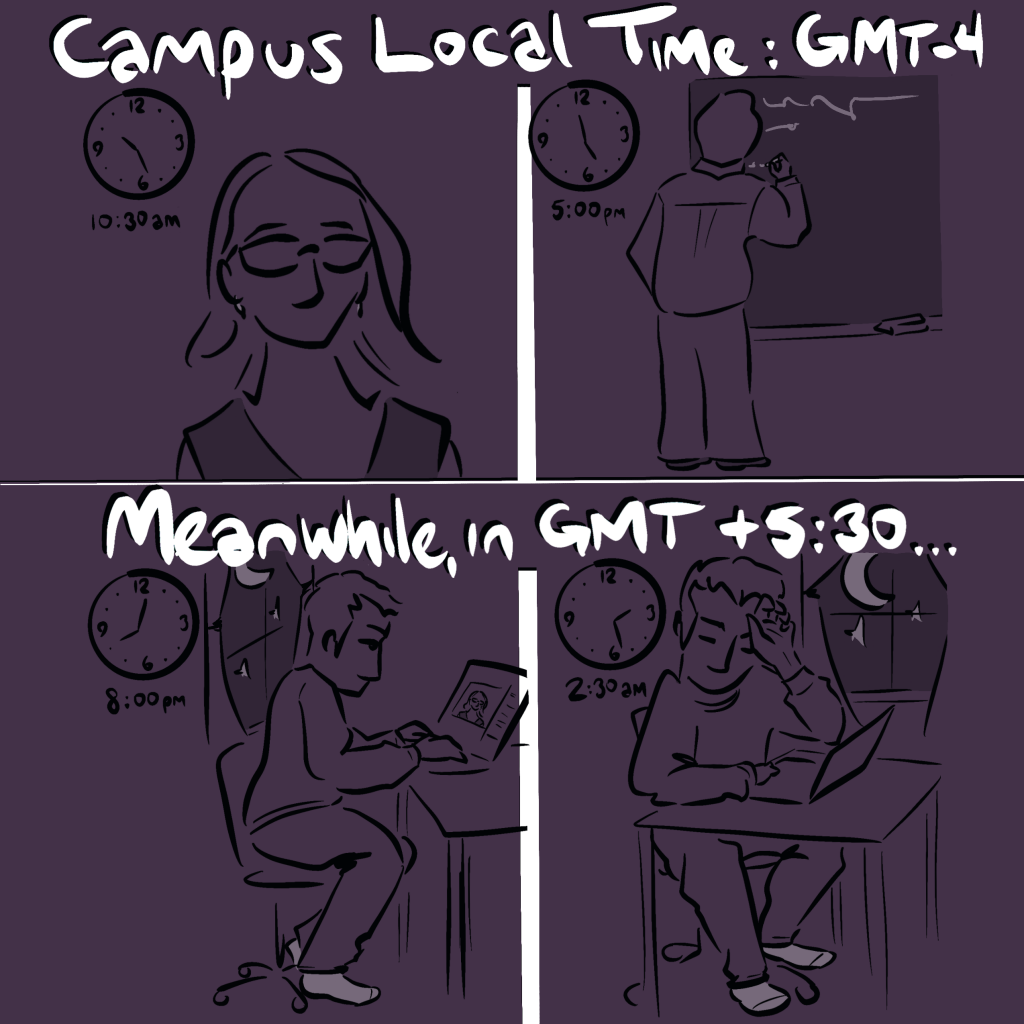Last semester, international students studying at Binghamton University had to choose between staying at BU to focus on their studies or returning to their home countries while they were still able to. This semester, students who stayed have not seen their families in months, while those who left must deal with the difficulties of studying from a completely different time zone.
Balaji Patra, an international student from India and undeclared junior, was barely able to make it back home from BU last semester.
“The Indian government issued a notice after I booked my flight that they would be suspending all international flights after [March 21],” Patra said. “On [March 19], my flight got canceled. There was a time where I had to change three different flights … it cost me around $7,000 with all the cancelations.”
Tavish Srivastava, an international student from India and senior majoring in computer science, has not returned to his home country since January. With only a single lottery-based flight per month leaving for Mumbai since the beginning of the coronavirus pandemic in the United States, he has little opportunity to visit home.
Last semester, Srivastava had problems with professors who weren’t experienced with online learning. Despite making his school year hard, he believes that the time professors had to prepare for this semester has made the experience work much better.
“It’s definitely been better, they’ve had more time to set up a system now,” Srivastava said. “They’ve had the summer to think about their course … it’s still a little rocky but definitely better than how it was back then.”
This semester, Patra is studying from home, and while he is interested in his classes, the pandemic is making it much harder for him to focus and study at the same level that he normally would.
“The subjects that [I am taking] are interesting this semester, so that’s a savior,” Patra said. “But [the time difference] is almost nine hours and 30 minutes … You have to be a nocturnal animal and stay up late and be online, and then sleep the whole day.”
Patra is able to keep up with class and do his work, but the time difference means that he has to start class at a time when most students have already ended their school day.
“My earliest class is at around 8 p.m. and the last class ends at 2:20 a.m.,” Patra said. “I was a coffee addict … but I decreased that a lot, and I guess the addiction is going to have to come back to me now.”
While there are still some struggles, Patra said that having to be online for part of last semester helped him prepare for studying from home.
“That was like a test run for me, the previous semester, during that time it was much more stressful for me,” Patra said. “During those times, sometimes I had to ask [for help] and the professors would say, ‘I understand, but that’s your issue and you need to figure it out.’ But this semester, the professors have become more understanding, so that’s a relief.”
Katja Kleinberg, an associate professor of political science, wrote in an email that BU has provided a variety of resources to help professors conduct an online semester, including ways to help international students.
“For instructors specifically, the Center for Learning and Teaching had a great number of resources and especially webinars over the summer,” Kleinberg wrote. “Those were designed to get instructors set up for the new types of online classes, give them new ideas for how to keep students engaged.”
Amanda Licht, assistant professor of political science, said that professors have been told to direct students to the International Student and Scholar Services (ISSS) office.
“The guidance has been basically to refer students to the ISSS office if they are having issues, as the staff there are up-to-date on the shifting policies and how the students are affected by them,” Licht wrote in an email. “My understanding is that the University is committed to helping international students navigate those policies and come up with schedules that will work for them. But, it is typically not the professors who are expected to help, as we have no relevant expertise.”
Srivastava said that one of the toughest parts about being away from home for so long is the distance from his parents, as the pandemic forced him to choose between returning home or staying to focus on his studies. However, he is approaching the situation with a positive mindset, and feels very grateful to be able to attend school in person this semester.
“Having family problems miles apart is so hard,” Srivastava said. “It could have been so much worse. I’m so blessed here.”
Outside of just academics, Patra has had trouble with other aspects of life that are missing because he is not in Binghamton. Patra and his international student friends all made use of the University Counseling Center, but are not able to use it this semester because they are not on campus.
“Because we are back home now, they are saying, ‘We won’t be able to help you with counseling or schedule a meeting with you because you are out of the [United States],” Patra said. “That doesn’t make sense because it’s not on us, and we pay tuition, we pay everything. It’s not about money, it’s about … there [being] a BU resource that maybe some people really depended on.”



